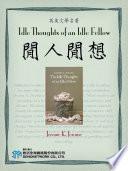Quotes from book
Idle Thoughts of an Idle Fellow

Idle Thoughts of an Idle Fellow, published in 1886, is a collection of humorous essays by Jerome K. Jerome. It was the author’s second published book and it helped establish him as a leading English humorist. While widely considered one of Jerome’s better works, and in spite of using the same style as Three Men in a Boat, it was never as popular as the latter. A second "Idle Thoughts" book, The Second Thoughts of An Idle Fellow, was published in 1898.

Idle Thoughts of an Idle Fellow (1886)
Context: All great literary men are shy. I am myself, though I am told it is hardly noticeable. I am glad it is not. It used to be extremely prominent at one time, and was the cause of much misery to myself and discomfort to every one about me—my lady friends especially complained most bitterly about it. A shy man's lot is not a happy one. The men dislike him, the women despise him, and he dislikes and despises himself. Use brings him no relief, and there is no cure for him except time.

Idle Thoughts of an Idle Fellow (1886)
Context: A solemn sadness reigns. A great peace is around us. In its light our cares of the working day grow small and trivial, and bread and cheese—ay, and even kisses—do not seem the only things worth striving for. Thoughts we cannot speak but only listen to flood in upon us, and standing in the stillness under earth's darkening dome, we feel that we are greater than our petty lives. Hung round with those dusky curtains, the world is no longer a mere dingy workshop, but a stately temple wherein man may worship, and where at times in the dimness his groping hands touch God's.

Idle Thoughts of an Idle Fellow (1886)
Context: And who would not risk its terrors to gain its raptures? Ah, what raptures they were! The mere recollection thrills you. How delicious it was to tell her that you loved her, that you lived for her, that you would die for her! How you did rave, to be sure, what floods of extravagant nonsense you poured forth, and oh, how cruel it was of her to pretend not to believe you! In what awe you stood of her! How miserable you were when you had offended her! And yet, how pleasant to be bullied by her and to sue for pardon without having the slightest notion of what your fault was! How dark the world was when she snubbed you, as she often did, the little rogue, just to see you look wretched; how sunny when she smiled! How jealous you were of every one about her! How you hated every man she shook hands with, every woman she kissed—the maid that did her hair, the boy that cleaned her shoes, the dog she nursed—though you had to be respectful to the last-named! How you looked forward to seeing her, how stupid you were when you did see her, staring at her without saying a word! How impossible it was for you to go out at any time of the day or night without finding yourself eventually opposite her windows!

Idle Thoughts of an Idle Fellow (1886)
Context: Poor little Angelina, too, sheds silent tears, for Edwin has given up carrying her old handkerchief in the inside pocket of his waistcoat. Both are astonished at the falling off in the other one, but neither sees their own change. If they did they would not suffer as they do. They would look for the cause in the right quarter—in the littleness of poor human nature—join hands over their common failing, and start building their house anew on a more earthly and enduring foundation. But we are so blind to our own shortcomings, so wide awake to those of others. Everything that happens to us is always the other person's fault. Angelina would have gone on loving Edwin forever and ever and ever if only Edwin had not grown so strange and different. Edwin would have adored Angelina through eternity if Angelina had only remained the same as when he first adored her. It is a cheerless hour for you both when the lamp of love has gone out and the fire of affection is not yet lit, and you have to grope about in the cold, raw dawn of life to kindle it. God grant it catches light before the day is too far spent. Many sit shivering by the dead coals till night come.